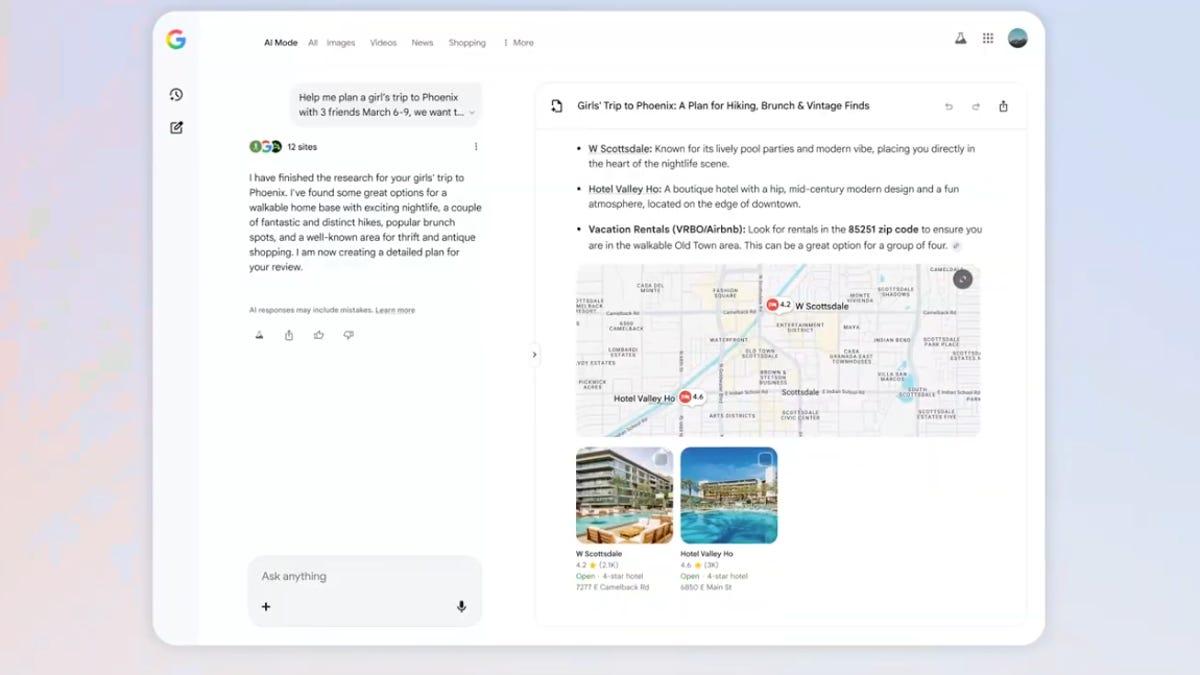Google Enhances Travel Planning with AI-Powered Hotel Price Tracking and Trip Itinerary Features
2 Sources
2 Sources
[1]
Need to Get Away? Google's Travel Search Can Now Track Hotel Prices
After years of Google offering to monitor airfares to help you grab the cheapest price for a chair in the sky, the tech giant is now offering the same assistance to book a bed on the ground, with hotel-rate tracking launching this week. "Simply tap the price-tracking toggle below the search filters, and you'll get an email if prices go down substantially for any of the hotels listed in the results," Google says in a blog post. "Our systems will account for the filters you've selected, like star rating or beach access, as well as the specific area you're viewing on the map." That post highlights another new feature to help with trip planning. If you give Google Maps access to your photos and then start taking screenshots of travel pictures found on social media and elsewhere online, Google Maps can lean on Google's Gemini AI to discern the locations of those pics and put them on a personalized map. In a break from Google's usual practice, Android users will have to wait to try this out. "This feature starts rolling out this week in the US in English on iOS -- and is coming soon to Android." Google is also using this opportunity to remind people to use Gemini and other AI tools to plan trips. My test of "create an itinerary for Washington, D.C., with a focus on local food" yielded a three-day outline that led off with breakfast at Eastern Market on Capitol Hill, followed by a half-smoke at Ben's Chili Bowl. That is legit though unoriginal advice, but you should verify Gemini's output like any other AI chatbot. The same goes for the Gems personalized AI agents that Google now suggests using for ongoing travel planning. Separately, Google shared some search data about where Americans would most like to get away. The top five international destinations, as discerned from Google Flights searches for departures from US airports from June 1 to Aug. 31, are Curaçao, Osaka, St. Lucia, Tokyo, and Rio de Janeiro. The top five domestic destinations are San Juan; Billings, Mont.; Nantucket, Mass.; St. Louis; and Providence, R.I. If there's a pattern among those seemingly random destinations beyond a certain fondness for places on or near water, we may need to turn to Gemini or some other AI app to find it.
[2]
Here's how Google Search can help you score a sweet deal on your next hotel booking
Hotel price tracking is rolling out globally this week on mobile and desktop. Google is upgrading some of its travel and planning tools ahead of the Summer breaks. Google Search's AI Overviews feature can now plan your entire cross-country trip, while Google Maps is adding a new tool to analyze screenshots to create a travel list. The next significant upgrade is coming to Google Search, allowing it to price-track hotels, too. Once you have a base plan ready for a trip, the next step is to look for flights and hotels. Google Search and even Google Flights are great for looking up flights, tracking prices, and getting price drop alerts on them. Now, Google Search can also give you price drop alerts for hotels for your chosen dates and destination. To price-track hotels, tap the price-tracking toggle below the search filters. You will receive an alert email if prices go down substantially for any of the hotels listed in the results. Google will account for filters like star rating and beach access, as well as the specific area of the map that you are viewing, so you, hopefully, won't be inundated with irrelevant alerts. Hotel price tracking is launching globally this week on mobile and desktop browsers on google.com/hotels.
Share
Share
Copy Link
Google introduces hotel price tracking and AI-powered trip planning features to its travel search tools, aiming to simplify vacation planning and help users find better deals.

Google Introduces Hotel Price Tracking Feature
Google has expanded its travel planning capabilities by introducing a new hotel price tracking feature to its search tools. This addition complements the existing airfare monitoring service, providing users with a comprehensive solution for finding the best deals on accommodations
1
.The new feature allows users to activate price tracking by toggling a switch below the search filters. Once enabled, users will receive email notifications when prices for their selected hotels decrease significantly. Google's system takes into account user-specified filters such as star ratings and amenities, ensuring that alerts are relevant to the user's preferences
2
.AI-Powered Trip Planning Enhancements
In addition to hotel price tracking, Google is leveraging its AI capabilities to enhance the overall travel planning experience:
-
Google Maps Photo Integration: Users who grant Google Maps access to their photos can now take screenshots of travel images from social media and other online sources. Google's Gemini AI will analyze these images to identify locations and create personalized maps, although this feature is currently rolling out only to iOS users in the US
1
. -
AI-Generated Itineraries: Google is promoting the use of its Gemini AI and other AI tools for trip planning. Users can request customized itineraries, such as "create an itinerary for Washington, D.C., with a focus on local food," which generates detailed travel plans
1
. -
Gems Personalized AI Agents: Google suggests using its Gems AI agents for ongoing travel planning assistance, offering a more personalized and interactive planning experience
1
.
Global Rollout and Availability
The hotel price tracking feature is being launched globally this week, accessible on both mobile and desktop browsers through google.com/hotels
2
. This rollout signifies Google's commitment to improving its travel-related services across multiple platforms.Related Stories
Popular Travel Destinations
Google has also shared insights into popular travel destinations based on Google Flights search data for summer departures from US airports. The top international destinations include Curaçao, Osaka, St. Lucia, Tokyo, and Rio de Janeiro, while domestic favorites are San Juan, Billings (Montana), Nantucket (Massachusetts), St. Louis, and Providence (Rhode Island)
1
.Implications for Travelers and the Travel Industry
These new features represent a significant step in Google's efforts to streamline the travel planning process and provide users with more tools to make informed decisions. By integrating AI-powered services and price tracking across both flights and hotels, Google is positioning itself as a comprehensive travel planning platform.
For travelers, these tools offer the potential for cost savings and more efficient trip planning. However, as with all AI-generated content, Google advises users to verify the information provided by its AI tools, including Gemini-generated itineraries
1
.For the travel industry, Google's expanding role in travel search and planning could have significant implications, potentially influencing how hotels and other travel services market and price their offerings in response to these new tracking and AI-powered recommendation features.
References
Summarized by
Navi
[2]
Related Stories
Google Enhances Travel Planning with AI-Powered Features in Maps, Search, and Gemini
27 Mar 2025•Technology

Google Launches AI-Powered 'Flight Deals' Tool Amid Antitrust Scrutiny and Fierce Competition
15 Aug 2025•Technology

Google Expands AI-Powered Travel Tools Globally with Canvas Planning and Enhanced Booking Features
17 Nov 2025•Technology

Recent Highlights
1
ByteDance's Seedance 2.0 AI video generator triggers copyright infringement battle with Hollywood
Policy and Regulation

2
Demis Hassabis predicts AGI in 5-8 years, sees new golden era transforming medicine and science
Technology

3
Nvidia and Meta forge massive chip deal as computing power demands reshape AI infrastructure
Technology





